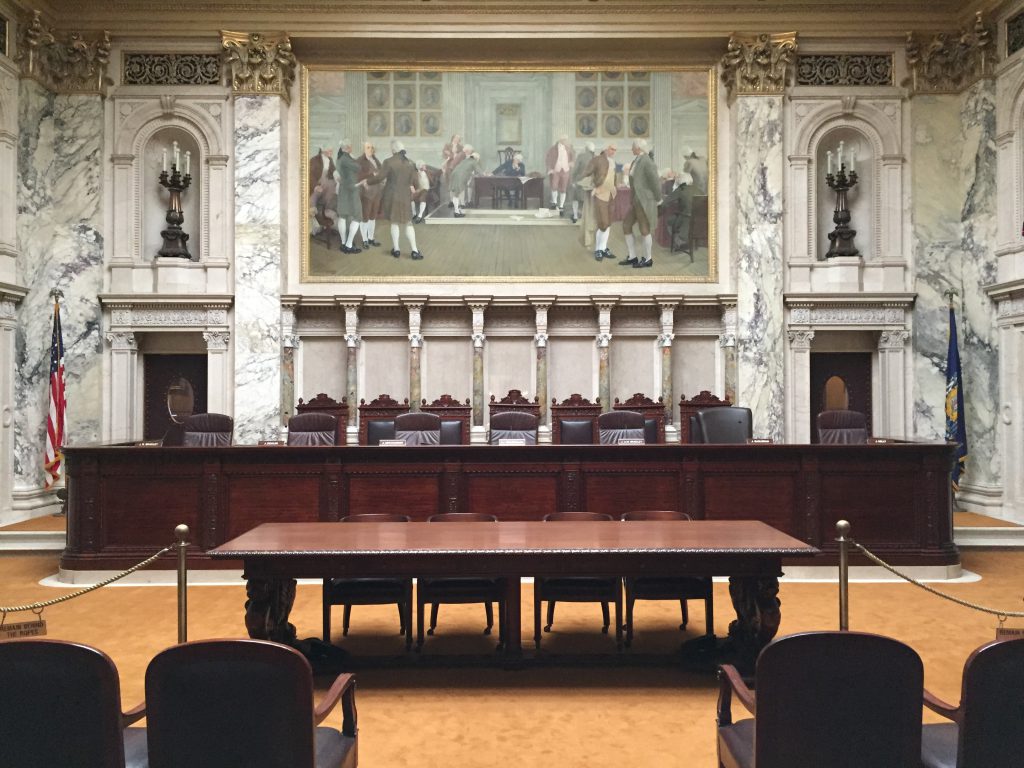Conservatives Argue Against Lame-Duck Lawsuit
Right-leaning members of Wisconsin Supreme Court skeptical in oral arguments on lawsuit challenging lame-duck session before Evers took office.
Conservatives on the Wisconsin Supreme Court struck a decidedly skeptical tone Wednesday during oral arguments in one of the lawsuits challenging the December lame-duck session of the Legislature that limited the power of Democratic Gov. Tony Evers.
The lawsuit, by the League of Women Voters of Wisconsin and other plaintiffs, contends the entire session was unlawful because the state constitution doesn’t explicitly allow legislators to meet in what’s known as an “extraordinary session.”
As League of Women Voters attorney Jeffrey Mandell stood to begin his arguments in the case, he was cut off immediately by conservative Justice Rebecca Bradley.
“You are asking this court to rule that the Wisconsin Legislature has been acting unconstitutionally for over four decades,” Bradley told Mandell. “How can that be? Don’t you find it extraordinary that nobody has raised this issue before this court in over four decades?”
Justice Daniel Kelly, another of the court’s conservatives, suggested later during arguments that the constitution had given state lawmakers and the governor the power to decide when and how often the Legislature should meet. He said that “put in a great big potential door” to hold session like the one in December.
Conservatives currently hold a 4-3 majority on the court, which gives them the power to decide issues like this one if they stick together as a block.
Chief Justice Patience Roggensack, while less aggressive in her questioning, did reference the court’s 2011 decision upholding Act 10, when conservatives gave the Legislature broad leeway to decide its own process.
The court’s other conservative, Justice Annette Ziegler, didn’t speak during arguments, and neither did Justice Shirley Abrahamson, a member of the court’s liberal block.
Liberal Justices Ann Walsh Bradley and Rebecca Dallet did talk, with both justices suggesting it was important to pay attention to the text of the constitution, which doesn’t allow for extraordinary sessions.
“I think that we should all focus on,” Dallet said. “Where is the law that tells us that you can call this extraordinary session?”
Dallet suggested if the Legislature wanted to pass a law allowing for “extraordinary sessions,” they could have done so.
The text of the state constitution only allows for the Legislature to meet “at such time as provided by law” or in a “special” session, which is a session called by the governor. It doesn’t mention “extraordinary sessions,” which are convened by committees of legislative leaders in Wisconsin.
While governors have been calling “special” sessions since shortly after Wisconsin became a state, “extraordinary” sessions are a more recent phenomenon, with the first one convened in 1980.
Republican attorney Misha Tseytlin, arguing for the Legislature, said it would be “remarkable” if the court were to rule against the Legislature on the grounds that it used the wrong name for its December session.
“I think as a matter of inner-branch respect and comity between the branches, that kind of ruling should not be entertained,” Tseytlin said.
Speaking after arguments, Mandell rejected the idea that conservatives had tipped their hand during arguments.
“I know that your job is to present these things in conservative-liberal terms, but the law and the world are more complicated than that,” Mandell told reporters.
“It’s still at the end of the day a constitutional question,” Mandell said. “It’s fundamentally a question of how the government exercises the limited power that the constitution gives it from the people.”
The League of Women Voters case was the first lawsuit filed specifically challenging December’s lame-duck session.
Dane County Judge Richard Niess sided with plaintiffs in March, issuing an order that overturned all the laws passed in the lame-duck session. Niess also invalidated 82 appointees of former Republican Gov. Scott Walker that were confirmed by the state Senate.
Evers seized on the ruling, using one of the powers that had been taken from him during the lame-duck session to direct Democratic Attorney General Josh Kaul to end Wisconsin’s participation in a lawsuit to overturn the Affordable Care Act. Kaul, whose powers had also been limited during the December session, quickly followed suit.
Evers also rescinded the appointments of all 82 Walker appointees, and while he reappointed most of them days later, he blocked others like Public Service Commissioner Ellen Nowak, a longtime Republican aide.
An appeals court stayed Niess’ ruling, putting it on hold while the case was appealed. But that same court ruled unanimously that Evers was in his right to block the appointments after Niess issued his decision.
The state Supreme Court disagreed, ruling all 82 appointees could return to work. In a 4-3 order, the court’s conservative majority wrote that while it was not weighing in on the merits of the case, Niess’ ruling should be stayed because the Legislature had a chance of winning.
The Wisconsin Supreme Court is also handling the appeal of another lame-duck lawsuit brought by Service Employees International Union and others in organized labor. It argues the session violated the state constitution’s separation of powers protections.
Two other lame-duck cases are in federal court. In one, U.S. District Court Judge James Peterson blocked restrictions on early voting passed during the lame-duck session. In the other, the state Democratic Party is arguing that the session violated the U.S. Constitution’s guarantee to a republican form of government where the majority rules.
Listen to the WPR report here.
Wisconsin Supreme Court’s Conservatives Strike was originally published by Wisconsin Public Radio.
More about the Lame Duck Laws
- Supreme Court Hears Case on Legislature’s Power - Sarah Lehr - Apr 3rd, 2025
- Four Years Later, State’s Lame Duck Law Still Faces Court Challenge - Shawn Johnson - Jan 17th, 2023
- Judge Rules Against Law Giving Legislators Power Over Attorney General Settlements - Shawn Johnson - May 11th, 2022
- State Supreme Court Dismisses AG’s Lame-Duck Lawsuit - Ruth Conniff - Mar 25th, 2021
- Kaul Sues Legislature Over Lame Duck Laws - Melanie Conklin - Nov 24th, 2020
- AG Kaul Announces Legal Action to Allow DOJ to Again Enforce Wisconsin Laws Without Unconstitutional Legislative Interference - Josh Kaul - Nov 23rd, 2020
- Vos Thinks Lame-Duck Session Didn’t Go Far Enough - Melanie Conklin - Jul 31st, 2020
- The State of Politics: Court Rulings Against Evers Sow Confusion - Steven Walters - Jul 20th, 2020
- Court Tosses Dems’ Lame-Duck Suit - Laurel White - Jul 16th, 2020
- Op Ed: State High Court Nullifies 2018 Election - James Rowen - Jul 12th, 2020
Read more about Lame Duck Laws here






















